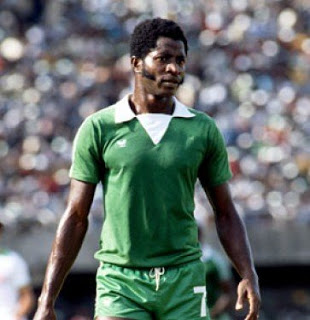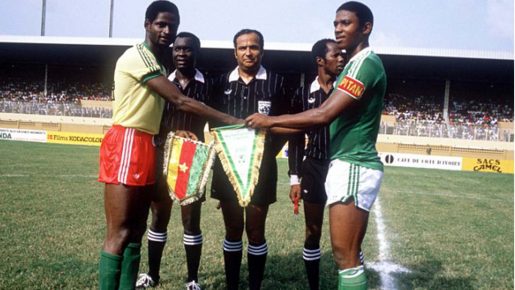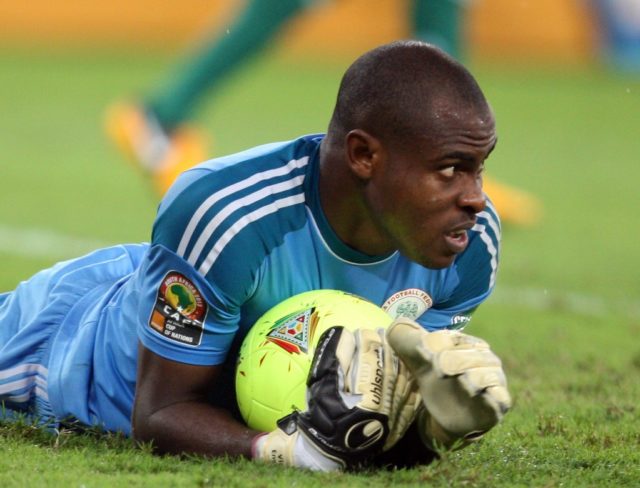Like anyone who has had more than a passing interest in Nigerian football over the past 40 odd years, I was rather puzzled when the Nigerian Football Federation named what it called a “Legends XI” team at its recent annual award show in Lagos.
Of course, controversy and this kind of list, whatever its criteria, tend to go hand and hand: comparing players across generations is hard enough at the best of times – heck, even naming the best in one season can provoke all sorts of contention. Football is, after all, about opinions, but the NFF, in addition to omitting some of the biggest names in Nigerian soccer history, chose to further muddy the waters by mixing genders.
In any case, the NFF – or whoever concocted this weird selection on their behalf – is entitled to its opinion. That very sentiment got me thinking: what if I picked my own all-time Nigeria XI? Why the heck not!
A few points before I get into it though:
It’s hard to disregard recency bias. For one thing, I can’t include players I didn’t see play so my time frame stretches back only about 40 years. So don’t expect to see names like Dan Anyiam or “Thunder” Balogun. I only ever read of them in books and magazines.

It’s hard to disregard moments of glory – they tend to carry more weight than an entire career body of work. This kind of ties in with recency bias too, since the Super Eagles have really only tasted international success in the years since 1980. Three Nations Cup wins and World Cup qualifications have come in that time span, so – even if I could look back to the 50s and 60s – it wouldn’t be out of place to see a preponderance of players from this era.
Finally, it’s hard to completely disregard club accomplishments, especially since football has become so much about making it in Europe over the last 25 years. But this being a Nigeria all-time selection, international performance trumps anything that happened in club colors – it’s primarily about the green white and green.
So, here goes. Feel free to disagree:
Goalkeeper: This got difficult right from the off. So many legendary keepers to run through with Emmanuel Okala, Best Ogedegbe and Peter Rufai immediately standing out, yet I find it hard to look beyond Vincent Enyeama, Nigeria’s most capped player (101 caps). Like the others, he won a Nations Cup in Nigerian colours, but also went a couple of steps further to win two CAF Champions League Cups with Enyimba and also prove himself in a major European league. It wasn’t just about being there when the teams won though; Enyeama has been outstanding all the way, named CAF Champions League Player of the year in 2004 and acquitting himself superbly in the French league, at four Nations Cup finals and three World Cup finals.
Right back: This was a difficult one for a different reason – a dearth of options. I never quite saw the best of Patrick Ekeji, the likes of Sylvanus Okpala and Austin Eguavoen were actually converted midfield players and Ruben Agboola sparkled way too briefly. It’s a bit of a cop out but I’ve plumped for David Adiele, who played in the 1980 Nations Cup winning team.

Centre backs: A position of real strength over the years. From the hapless Godwin Odiye, through the uncompromising Sunday Egboigbe to gentle giant Uche Okechukwu and the flamboyant Taribo West there’s lots to pick from. But there’s no way to look beyond two Nations Cup winning captains – Christian “Chairman” Chukwu and Stephen “Big Boss” Keshi, two exemplary leaders who, in different ways, defined their eras.
Chukwu was a reliable rock at the back as Nigeria first flirted with continental success in the late 70s, and he lifted the Eagles’ first Nations Cup in Lagos in 1980.
Keshi, named captain at 21, was at a time in the late 80s, defender, organizer, goalscorer and inspirational leader, all rolled into one, but his biggest influence was probably off the field where he opened the way to Europe for a generation of Nigerian players.
Left back: For me, one name stands head and shoulders above any other: Yisa “Otobo” Sofoluwe, the finest full back I ever saw in Nigerian colours. Never overly aggressive – in the manner of say Bright Omokaro – Sofoluwe was silky smooth, very strong defensively and contributed positively with his intelligent overlapping as well. Came up straight from the U-20s in 1983 and featured in two Nations Cup finals (1984 and 1988) before sadly disappearing into Belgian lower league obscurity. So good, If I could clone him, I’d pick him at right back too.
Right Midfield: It takes something to leave Finidi George out of this selection, but it’s simply impossible for me to leave out his replacement: the incomparable, indefatigable Mudashiru Lawal. A whirling dynamo of a midfield player who played a big part in the 1980 Nations Cup triumph – scoring in the final – and then returned four years later to inspire a young team to another final in which he scored again.
Defensive Midfield: For nine largely successful years, Sunday Oliseh graced the Super Eagles midfield with skill, dedication and authority. From his debut against Ethiopia in 1993, it was obvious we had a different kind of player in our hands – a young Nigerian who had learnt his trade entirely in Europe. By the time the Nations Cup rolled around a year later his awareness, tenacity and smooth passing had made him, at 20, one of the pillars of the team and one of the most creative defensive midfielders to play the game.
Back before we started counting “assists”, Oliseh was the pass-master. Of Nigeria’s six goals from open play at Tunisia 94, his long range passing created no less than five, including three of Rashidi Yekini’s five goals and Emmanuel Amuneke’s winning goal in the final. He also played on the Olympic Gold winning team in 1996 and will always be remembered for a spectacular 20-yard winner against Spain at the 1998 World Cup.
Attacking midfield: Another no-brainer: Augustine “JayJay” Okocha, Nigeria’s number 10 from the day he made his debut in 1993 till he hung up those magical boots in 2006. The most skillful Nigerian player I ever saw, Okocha graced five Nations Cup finals and three World Cup finals, and made his mark in Germany, Turkey, France and England. His emergence unsurprisingly coincided with the most illustrious era of Nigerian football. Twelve years after his last game, Nigerians are still yearning for a true number 10 – just like we were in the many years preceding his emergence.
Left Midfield: This was a difficult call between two outstanding talents. Adokie Amiesimaka’s dribbling wizardry was a key part of the 1980 triumph, but my vote marginally goes to Emmanuel Amuneke, a much more direct and versatile player with an eye for the big occasion. One of the 1993 debutants that won the Nations Cup in 1994, Amuneke scored both goals in the final against Zambia, then scored to secure the Afro-Asia Cup against Uzbekistan in Lagos the following year before capping it with the Olympic Gold winner against Argentina at Atlanta 96. He was a thrilling mix of skill, power and speed.
Forwards: One name picks itself. Not only was Rashidi Yekini Nigeria’s record goalscorer (37 goals in 58 caps) his goals also helped the Super Eagles to three Nations Cup finals and one semi-final, as well as qualifying for the World Cup for the very first time in 1994. Yekini was Nations Cup Golden Boot winner in 1992 and 1994, and only two players have scored more than his Nations Cup total of 13 goals. He scored Nigeria’s first ever goal at the World Cup in 1994.
At second striker and last – definitely not least – name on my team is the legendary Segun Odegbami, the star and of the 1980 Nations Cup team. “Big Sheg” was already well known across Africa and his three goals – two in the final – only further enhanced his fame. Nominally played as a right winger, where his speed and dribbling skills tormented many fullbacks, but he could finish too (22 goals in 47 caps).
There you have it. My Nigeria All-Time Best XI:
(4-4-2): Enyeama – Adiele, Chukwu, Keshi, Sofoluwe – Lawal, Oliseh, Okocha, Amuneke – Yekini, Odegbami
And to coach them? None other than Clemens Westerhof, a Dutchman who quickly grasped the Nigerian psyche and built a team that best exploited the strengths of his players. Won Nations Cup Gold, Silver and Bronze and took Nigeria to the World Cup for the very first time.
That’s my take. Let’s have yours.










This is a well thought out list. The articulation of the thinking is also splendid. What the NFF can do to help deepen this research work is to help upload videos of the mysterious Thunder Balogun et al on You tube.
This is finally a list I can’t really argue with. To me the most difficult pick is actually between Finidi and Lawal. You have to agree Finidi has more cups under his belt and was a globally rated footballer
Well thought through. Obviously easier for an individual, applying the timeframe parameter. It is different for a FIFA World All-time 11 or an NFF Nigeria All-time 11. The excuse of timeframe does not apply. The NFF has to pick from when the national team came into existence, and that makes consensus even more difficult because their audience belong to several generations. I cannot argue with my father that Teslim Balogun was not better than Rashidi Yekini. And in future, my son would struggle with my choice of Yekini, who he never saw play.
This is a more balanced view that even when one does not agree with all the picks (For example I would have gone for Dodo Manyana in goal probably, though I would not say Enyeame is an unworthy pick. Just an example) you can actually see the logical thought process that has gone into it. Good job Sir!
I could not have reasoned and chosen better!
The NFF should simply adopt your work (and give you credit).
Again, your reasoning and selection is First Class